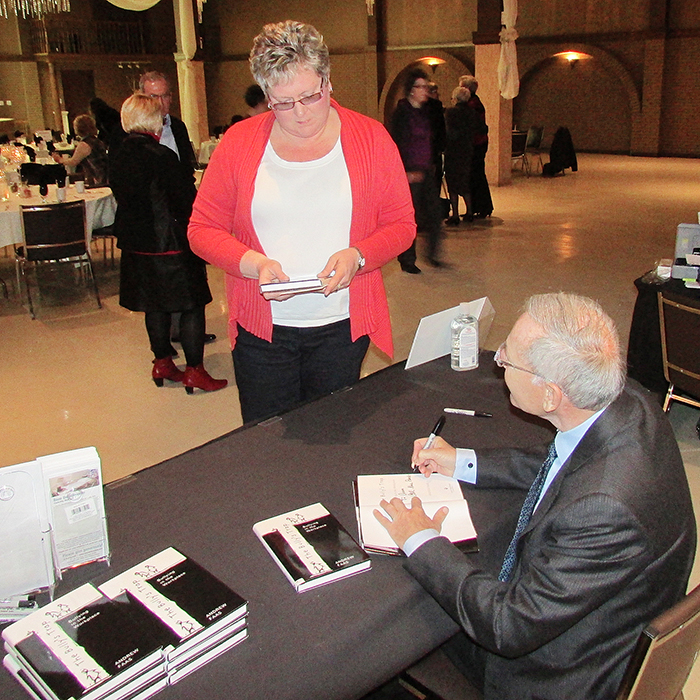
Ann Pollack receives her signed copy of Andrew Faas’ book, “The Bully’s Trap,” during a luncheon sponsored by the Foundation of the Chatham-Kent Health Alliance.
If North America had an epidemic that was costing billions of dollars, destroying the lives of tens of thousands, resulting in illness, death and even murder, something would be done about it.
We do have such an epidemic. But until now, that problem has been considered a normal part of society.
Andrew Faas is setting out to change that with his groundbreaking book on poisoned workplaces, “The Bully’s Trap.”
Faas, a Dresden native who had a highly successful career with Loblaws and Shoppers Drug Mart, shared his message with more than 100 persons at a luncheon sponsored by the Chatham-Kent Health Alliance.
Chatham Mazda from Chatham Voice on Vimeo.
His claims about workplace bullying may seem shocking, but after five years and hundreds of interviews, Faas said it’s an accurate, if not understated, view of the subject.
“Everyone I met had a story – everyone,” he said. “This is an incredibly important issue which has been simply ignored for too long.”
Faas said workplace bullying has been in the news recently due to high-profile cases such that of Jian Ghomeshi, the former CBC Radio host who was fired amid growing allegations of sexual and other abuse both in and outside of the workplace.
Faas said he has no inside knowledge of that case but is virtually certain CBC management knew about it and allowed it to flourish.
Much like sexual assault, he said there has been an inherent tendency to blame the victim.
“We say people are too sensitive, that they need to toughen up or tell each other that’s just the way it is,” he said. “That way the culture isn’t blamed because it’s the victim’s fault. It’s incredibly cruel and unfair.”
Workplace bullying takes a number of forms including verbal, psychological and physical.
“People are terrorized, and it’s done with the approval of management because they refuse to acknowledge that they’re part of it,” he said. ‘It leads to stress, substance abuse, family breakdown, suicide and murder.
“The U.S. Department of Justice says the workplace is the most dangerous place to be in America.”
He said employees are often bullied as part of a group mentality that uses the abuse to make the employee earn his or her part on the employment team.
“There is no doubt that employees must prove their worth but this type of bullying goes far beyond anyone’s normal definition of that. It’s simply cruelty.”
He said ultra competitive workplaces with increasing emphasis on immediate results, creates a culture where only those deemed strong enough to survive bullying are worthy of a place.
Faas said he’s experienced both sides of the bullying issue. Fairly early in his career, a senior executive asked him how the firm should deal with an up-and-coming manager who was achieving goals by bullying.
“I’d fire the SOB,” Faas said before being told, “’The problem, my son, is the young SOB I’m talking about is you.’”
That realization led to changes in his management style which led to him becoming youngest vice-president of Loblaws.
Later in his career, Faas brought to light corrupt practices of an executive, only have to deal with a campaign of terror against him that included hacking his communications, harassment and even a death threat.
“It took an enormous toll on me physically and psychologically,” he said. “Without the support of those around me, the results could have been far worse.”
It was during that dark time that he did two things that he believes are vital to survival.
“You need to talk to people who will help you, and in my case I needed to get a dog,” he said. “The unconditional love and non-judgment of a pet made a huge difference.”
It was so profound that he dedicated his book to Rollie, a Weimarner puppy he adopted during his darkest time.
“There is no question he helped me survive a horrific time and in the process made me a better person,” he wrote in the dedication.
The book, released only three months ago, is in its second printing, with plans for it to be released on a wider scale later this year in the United States.
All profits from the book are directed to the Faas Foundation, which focuses on health care, education and medical research.
An internationally acclaimed philanthropist, he pledged $1 million to the Centre for Addiction and Mental Health (CAMH), to establish Well@Work, a program to help organizations create psychologically safe work environments.
He is the largest Canadian donor to Doctors without Borders and has been awarded the ICRF Humanitarian Award from the ICRF’s Canadian Chapter, Beacon of Hope award from their New York Chapter and the Outstanding Philanthropist Award from the Association of Fundraising Professionals.
For more information about ordering “The Bully’s Trap,” go to http://thebullystrap.com/







Glad to see this Mr Faas will be better to read the book